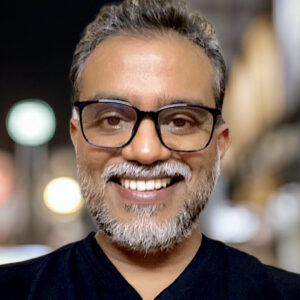
In the rapidly evolving landscape of healthcare, few voices resonate as profoundly as that of Praveen Suthrum, renowned healthcare futurist, author, and co-founder of NextServices and GI Mastermind. Suthrum will give the opening keynote address at the upcoming AGA Tech Summit, providing context for what is happening now in the field and the transformative potential of innovation and technology in the years to come. AGA staff met with Suthrum to discuss his keynote address and his thoughts about the role of innovation in healthcare, and specifically in gastroenterology.
A visionary perspective
Suthrum’s insights are rooted in a deep understanding of the exponential growth of technology and its implications for healthcare. According to Suthrum, “the future of gastroenterology is not just about incremental improvements but about embracing radical, exponential changes.” Over the next decade, gastroenterology will be defined by its ability to embrace innovation. The convergence of artificial intelligence (AI), digital health, and other exponential technologies is set to revolutionize patient care. Technologies such as AI and machine learning already are being integrated into endoscopic procedures, enhancing diagnostic accuracy, and enabling early detection of GI diseases.
Challenges to innovation
Three key challenges facing GI innovators are: 1) creating time and space for groundbreaking advancements, 2) thinking beyond traditional approaches to explore new possibilities, and 3) fully leveraging AI to transform patient care.
Creating time for innovation
Gastroenterologists are among the most brilliant minds in medicine, yet their demanding schedules often prevent them from innovating. Suthrum frequently hears the same concerns from attendees of his GI Mastermind program.
“Gastroenterologists tell me that they’re often so busy that they don’t have time to innovate,” Suthrum shares. “They’re often told that they need to generate volumes, meet billing targets, and maximize efficiency, which leaves little room for innovation.”
Gastroenterologists must find ways to carve out time for strategic thinking and experimentation. Making space for creativity is essential—whether through dedicated innovation blocks, restructured workflows, or new financial models that prioritize long-term progress over immediate volume.
Broadening your perspective
The focus in gastroenterology often remains narrowly centered on traditional diagnostic and treatment methods, rather than the full spectrum of gut health. This perspective means missed opportunities in areas like the microbiome.
“We’re not viewing the GI tract in its entirety,” Suthrum points out. “We’re missing opportunities right now. For example, the microbiome space is exploding with startups, yet there is little guidance from the GI community. Patients are looking to gastroenterologists for direction, but very few have stepped forward to lead.”
Gastroenterologists have the expertise to be at the forefront of microbiome research, gut–brain axis breakthroughs, digital therapeutics, apps, wearables and holistic gut health solutions. To do so, they need to engage with emerging areas that are shaping the future of GI care.
Taking full advantage of AI
According to Suthrum, AI represents one of the most transformative forces in medicine, yet in gastroenterology, its use remains largely confined to polyp detection. “This is just one aspect of a much larger canvas. We need to think beyond that,” shares Suthrum.
At a recent AI in GI Summit, Suthrum challenged attendees with a provocative question: “What if you didn’t have to perform as many colonoscopies — then what would you do instead?” He urges the field to think bigger and consider how AI, robotics, and digital biology could converge to shift GI care into entirely new settings, even inside a self-driving car.
The future is ours to shape
Suthrum’s vision for the future of gastroenterology is both inspiring and practical. He calls on gastroenterologists to embrace the inevitable digital revolution and to rethink their approaches to patient care. The greatest risk to the field isn’t a lack of innovation — it’s the failure to make space for it. By addressing time constraints, broadening the scope of GI practice, and embracing AI beyond its current applications, the field can position itself at the cutting edge of healthcare.
“We have to be willing to step back and reimagine what’s possible,” Suthrum emphasizes. “Otherwise, we’ll find ourselves reacting to change rather than leading it.”
The future of gastroenterology involves more than better diagnostics and treatments. It’s about redefining the very boundaries of the field itself. The question is, will we just watch this digital transformation from the sidelines? Or, will we be part of the force that shapes the future?
About Praveen Suthrum
Praveen Suthrum is an entrepreneur and healthcare futurist who co-founded NextServices, a company driving business efficiency and digital innovation for gastroenterology practices, labs, ASCs, and healthcare companies with AI-based solutions. Additionally, he is the author of The Shift: How Digital Innovation Is Irreversibly Transforming Gastroenterology and Healthcare and two other books, runs the GI Mastermind leadership program, and hosts a popular podcast called “The Scope Forward Show.”
About the AGA Tech Summit
The 2025 AGA Tech Summit will be held April 3-4 in Chicago, IL. The summit brings together GI innovators, startup companies, investors, and industry leaders with the common goal of advancing innovation in the field of gastroenterology. This year’s summit will focus on the evolving GI landscape, bridging the gap between FDA approval and reimbursement, finding the right regulatory path, and understanding what catches the eyes of investors. Other highlights include the Shark Tank Pitch Competition, Innovation Showcase, and VC/Startup Consultations.












